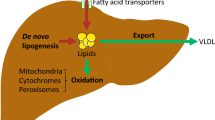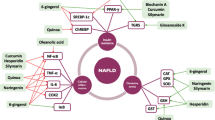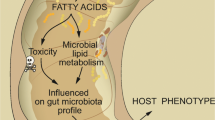Abstract
Purpose
The aim of the present study was to investigate the in vivo effects of dietary medium-chain triglyceride (MCT) on inflammation and insulin resistance as well as the underlying potential molecular mechanisms in high fat diet-induced obese mice.
Methods
Male C57BL/6J mice (n = 24) were fed one of the following three diets for a period of 12 weeks: (1) a modified AIN-76 diet with 5 % corn oil (normal diet); (2) a high-fat control diet (17 % w/w lard and 3 % w/w corn oil, HFC); (3) an isocaloric high-fat diet supplemented with MCT (17 % w/w MCT and 3 % w/w corn oil, HF–MCT). Glucose metabolism was evaluated by fasting blood glucose levels and intraperitoneal glucose tolerance test. Insulin sensitivity was evaluated by fasting serum insulin levels and the index of homeostasis model assessment-insulin resistance. The levels of serum interleukin-6 (IL-6), interleukin-10 (IL-10), and tumor necrosis factor-α were measured by ELISA, and hepatic activation of nuclear factor κB (NF-κB) and mitogen-activated protein kinase (MAPK) pathways was determined using western blot analysis.
Results
Compared to HFC diet, consumption of HF-MCT did not induce body weight gain and white adipose tissue accumulation in mice. HFC-induced increases in serum fasting glucose and insulin levels as well as glucose intolerance were prevented by HF-MCT diet. Meanwhile, HF-MCT resulted in significantly lower serum IL-6 level and higher IL-10 level, and lower expression levels of inducible nitric oxide synthase and cyclooxygenase-2 protein in liver tissues when compared to HFC. In addition, HF-MCT attenuated HFC-triggered hepatic activation of NF-κB and p38 MAPK.
Conclusions
Our study demonstrated that MCT was efficacious in suppressing body fat accumulation, insulin resistance, inflammatory response, and NF-κB and p38 MAPK activation in high fat diet-fed mice. These data suggest that MCT may exert beneficial effects against high fat diet-induced insulin resistance and inflammation.





Similar content being viewed by others
References
Li Q, Zhong W, Qiu Y, Kang X, Sun X, Tan X, Zhao Y, Sun X, Jia W, Zhou Z (2013) Preservation of hepatocyte nuclear factor-4alpha contributes to the beneficial effect of dietary medium chain triglyceride on alcohol-induced hepatic lipid dyshomeostasis in rats. Alcohol Clin Exp Res 37:587–598
Shinohara H, Wu J, Aoyama T (2010) Effect of randomly interesterified triacylglycerol containing medium- and long-chain fatty acids on hepatic fatty acid oxidation after a single administration to rats. Biosci Biotechnol Biochem 74:2336–2338
Shinohara H, Wu J, Kasai M, Aoyama T (2006) Randomly interesterified triacylglycerol containing medium- and long-chain fatty acids stimulates fatty acid metabolism in white adipose tissue of rats. Biosci Biotechnol Biochem 70:2919–2926
Shinohara H, Ogawa A, Kasai M, Aoyama T (2005) Effect of randomly interesterified triacylglycerols containing medium- and long-chain fatty acids on energy expenditure and hepatic fatty acid metabolism in rats. Biosci Biotechnol Biochem 69:1811–1818
Takeuchi H, Sekine S, Kojima K, Aoyama T (2008) The application of medium-chain fatty acids: edible oil with a suppressing effect on body fat accumulation. Asia Pac J Clin Nutr 17(Suppl 1):320–323
St-Onge MP, Ross R, Parsons WD, Jones PJ (2003) Medium-chain triglycerides increase energy expenditure and decrease adiposity in overweight men. Obes Res 11:395–402
St-Onge MP, Jones PJ (2003) Greater rise in fat oxidation with medium-chain triglyceride consumption relative to long-chain triglyceride is associated with lower initial body weight and greater loss of subcutaneous adipose tissue. Int J Obes Relat Metab Disord 27:1565–1571
Nosaka N, Maki H, Suzuki Y, Haruna H, Ohara A, Kasai M, Tsuji H, Aoyama T, Okazaki M, Igarashi O, Kondo K (2003) Effects of margarine containing medium-chain triacylglycerols on body fat reduction in humans. J Atheroscler Thromb 10:290–298
St-Onge MP, Bosarge A, Goree LL, Darnell B (2008) Medium chain triglyceride oil consumption as part of a weight loss diet does not lead to an adverse metabolic profile when compared to olive oil. J Am Coll Nutr 27:547–552
Bourque C, St-Onge MP, Papamandjaris AA, Cohn JS, Jones PJ (2003) Consumption of an oil composed of medium chain triacyglycerols, phytosterols, and N-3 fatty acids improves cardiovascular risk profile in overweight women. Metabolism 52:771–777
Ronis MJ, Baumgardner JN, Sharma N, Vantrease J, Ferguson M, Tong Y, Wu X, Cleves MA, Badger TM (2013) Medium chain triglycerides dose-dependently prevent liver pathology in a rat model of non-alcoholic fatty liver disease. Exp Biol Med (Maywood) 238:151–162
Zhao W, Varghese M, Vempati P, Dzhun A, Cheng A, Wang J, Lange D, Bilski A, Faravelli I, Pasinetti GM (2012) Caprylic triglyceride as a novel therapeutic approach to effectively improve the performance and attenuate the symptoms due to the motor neuron loss in ALS disease. PLoS One 7:e49191
Carlson SJ, Nandivada P, Chang MI, Mitchell PD, O’Loughlin A, Cowan E, Gura KM, Nose V, Bistrian BR, Puder M (2015) The addition of medium-chain triglycerides to a purified fish oil-based diet alters inflammatory profiles in mice. Metabolism 64:274–282
Kono H, Fujii H, Ogiku M, Tsuchiya M, Ishii K, Hara M (2010) Enteral diets enriched with medium-chain triglycerides and N-3 fatty acids prevent chemically induced experimental colitis in rats. Transl Res 156:282–291
Mane J, Pedrosa E, Loren V, Ojanguren I, Fluvia L, Cabre E, Rogler G, Gassull MA (2009) Partial replacement of dietary (n-6) fatty acids with medium-chain triglycerides decreases the incidence of spontaneous colitis in interleukin-10-deficient mice. J Nutr 139:603–610
Hoshimoto A, Suzuki Y, Katsuno T, Nakajima H, Saito Y (2002) Caprylic acid and medium-chain triglycerides inhibit IL-8 gene transcription in Caco-2 cells: comparison with the potent histone deacetylase inhibitor trichostatin A. Br J Pharmacol 136:280–286
Gregor MF, Hotamisligil GS (2011) Inflammatory mechanisms in obesity. Annu Rev Immunol 29:415–445
Tanti JF, Ceppo F, Jager J, Berthou F (2012) Implication of inflammatory signaling pathways in obesity-induced insulin resistance. Front Endocrinol (Lausanne) 3:181
Arkan MC, Hevener AL, Greten FR, Maeda S, Li ZW, Long JM, Wynshaw-Boris A, Poli G, Olefsky J, Karin M (2005) IKK-beta links inflammation to obesity-induced insulin resistance. Nat Med 11:191–198
Tanti JF, Jager J (2009) Cellular mechanisms of insulin resistance: role of stress-regulated serine kinases and insulin receptor substrates (IRS) serine phosphorylation. Curr Opin Pharmacol 9:753–762
Hotamisligil GS (2006) Inflammation and metabolic disorders. Nature 444:860–867
Boisramé-Helms J, Said A, Burban M, Delabranche X, Stiel L, Zobairi F, Hasselmann M, Schini-Kerth V, Toti F, Meziani F (2014) Medium-chain triglyceride supplementation exacerbates peritonitis-induced septic shock in rats: role on cell membrane remodeling. Shock 42:548–553
Boisramé-Helms J, Delabranche X, Klymchenko A, Drai J, Blond E, Zobairi F, Mely Y, Hasselmann M, Toti F, Meziani F (2014) Lipid emulsions differentially affect LPS-induced acute monocytes inflammation: in vitro effects on membrane remodeling and cell viability. Lipids 49:1091–1099
Terada S, Yamamoto S, Sekine S, Aoyama T (2012) Dietary intake of medium- and long-chain triacylglycerols ameliorates insulin resistance in rats fed a high-fat diet. Nutrition 28:92–97
Han JR, Deng B, Sun J, Chen CG, Corkey BE, Kirkland JL, Ma J, Guo W (2007) Effects of dietary medium-chain triglyceride on weight loss and insulin sensitivity in a group of moderately overweight free-living type 2 diabetic Chinese subjects. Metabolism 56:985–991
Karin M, Ben-Neriah Y (2000) Phosphorylation meets ubiquitination: the control of NF-[kappa]B activity. Annu Rev Immunol 18:621–663
Basak S, Hoffmann A (2008) Crosstalk via the NF-kappaB signaling system. Cytokine Growth Factor Rev 19:187–197
Kyriakis JM, Avruch J (2012) Mammalian MAPK signal transduction pathways activated by stress and inflammation: a 10-year update. Physiol Rev 92:689–737
Vermeulen L, De Wilde G, Van Damme P, Vanden Berghe W, Haegeman G (2003) Transcriptional activation of the NF-kappaB p65 subunit by mitogen- and stress-activated protein kinase-1 (MSK1). EMBO J 22:1313–1324
Kefaloyianni E, Gaitanaki C, Beis I (2006) ERK1/2 and p38-MAPK signalling pathways, through MSK1, are involved in NF-kappaB transactivation during oxidative stress in skeletal myoblasts. Cell Signal 18:2238–2251
Harford KA, Reynolds CM, McGillicuddy FC, Roche HM (2011) Fats, inflammation and insulin resistance: insights to the role of macrophage and T-cell accumulation in adipose tissue. Proc Nutr Soc 70:408–417
Kintscher U, Hartge M, Hess K, Foryst-Ludwig A, Clemenz M, Wabitsch M, Fischer-Posovszky P, Barth TF, Dragun D, Skurk T, Hauner H, Bluher M, Unger T, Wolf AM, Knippschild U, Hombach V, Marx N (2008) T-lymphocyte infiltration in visceral adipose tissue: a primary event in adipose tissue inflammation and the development of obesity-mediated insulin resistance. Arterioscler Thromb Vasc Biol 28:1304–1310
Espinola-Klein C, Gori T, Blankenberg S, Munzel T (2011) Inflammatory markers and cardiovascular risk in the metabolic syndrome. Front Biosci (Landmark Ed) 16:1663–1674
Tang FY, Pai MH, Chiang EP (2012) Consumption of high-fat diet induces tumor progression and epithelial-mesenchymal transition of colorectal cancer in a mouse xenograft model. J Nutr Biochem 23:1302–1313
Park H, Kim M, Kwon GT, Lim do Y, Yu R, Sung MK, Lee KW, Daily JW 3rd, Park JH (2012) A high-fat diet increases angiogenesis, solid tumor growth, and lung metastasis of CT26 colon cancer cells in obesity-resistant BALB/c mice. Mol Carcinog 51:869–880
Burgueno AL, Gianotti TF, Mansilla NG, Pirola CJ, Sookoian S (2013) Cardiovascular disease is associated with high-fat-diet-induced liver damage and up-regulation of the hepatic expression of hypoxia-inducible factor 1alpha in a rat model. Clin Sci (Lond) 124:53–63
Yao L, Herlea-Pana O, Heuser-Baker J, Chen Y, Barlic-Dicen J (2014) Roles of the chemokine system in development of obesity, insulin resistance, and cardiovascular disease. J Immunol Res 2014:181450
Bastard JP, Maachi M, Lagathu C, Kim MJ, Caron M, Vidal H, Capeau J, Feve B (2006) Recent advances in the relationship between obesity, inflammation, and insulin resistance. Eur Cytokine Netw 17:4–12
Dinh CH, Szabo A, Camer D, Yu Y, Wang H, Huang XF (2015) Bardoxolone methyl prevents fat deposition and inflammation in the visceral fat of mice fed a high-fat diet. Chem Biol Interact 229:1–8
Cai D, Yuan M, Frantz DF, Melendez PA, Hansen L, Lee J, Shoelson SE (2005) Local and systemic insulin resistance resulting from hepatic activation of IKK-beta and NF-kappaB. Nat Med 11:183–190
Lin HL, Shen KP, Chang WT, Lin JC, An LM, Chen IJ, Wu BN (2013) Eugenosedin-A prevents high-fat diet increased adhesion molecules through inhibition of MAPK- and p65-mediated NF-kappaB pathway in rat model. J Pharm Pharmacol 65:300–309
Wang Z, Xue L, Guo C, Han B, Pan C, Zhao S, Song H, Ma Q (2012) Stevioside ameliorates high-fat diet-induced insulin resistance and adipose tissue inflammation by downregulating the NF-kappaB pathway. Biochem Biophys Res Commun 417:1280–1285
Liu K, Zhao W, Gao X, Huang F, Kou J, Liu B (2012) Diosgenin ameliorates palmitate-induced endothelial dysfunction and insulin resistance via blocking IKKbeta and IRS-1 pathways. Atherosclerosis 223:350–358
Tang T, Zhang J, Yin J, Staszkiewicz J, Gawronska-Kozak B, Jung DY, Ko HJ, Ong H, Kim JK, Mynatt R, Martin RJ, Keenan M, Gao Z, Ye J (2010) Uncoupling of inflammation and insulin resistance by NF-kappaB in transgenic mice through elevated energy expenditure. J Biol Chem 285:4637–4644
Tuncman G, Hirosumi J, Solinas G, Chang L, Karin M, Hotamisligil GS (2006) Functional in vivo interactions between JNK1 and JNK2 isoforms in obesity and insulin resistance. Proc Natl Acad Sci USA 103:10741–10746
Kuo LH, Tsai PJ, Jiang MJ, Chuang YL, Yu L, Lai KT, Tsai YS (2011) Toll-like receptor 2 deficiency improves insulin sensitivity and hepatic insulin signalling in the mouse. Diabetologia 54:168–179
Hemi R, Yochananov Y, Barhod E, Kasher-Meron M, Karasik A, Tirosh A, Kanety H (2011) p38 mitogen-activated protein kinase-dependent transactivation of ErbB receptor family: a novel common mechanism for stress-induced IRS-1 serine phosphorylation and insulin resistance. Diabetes 60:1134–1145
Gao D, Nong S, Huang X, Lu Y, Zhao H, Lin Y, Man Y, Wang S, Yang J, Li J (2010) The effects of palmitate on hepatic insulin resistance are mediated by NADPH Oxidase 3-derived reactive oxygen species through JNK and p38MAPK pathways. J Biol Chem 285:29965–29973
Xi L, Xiao C, Bandsma RH, Naples M, Adeli K, Lewis GF (2011) C-reactive protein impairs hepatic insulin sensitivity and insulin signaling in rats: role of mitogen-activated protein kinases. Hepatology 53:127–135
Acknowledgments
This study was supported by National Natural Science Foundation of China (81202194, 81072330, 81373005), University Natural Science Research Project in Jiangsu Province (10KJB330001), and the Priority Academic Program Development of Jiangsu Higher Education Institutions (Public Health and Preventive Medicine). The funders had no role in study design, data collection and analysis, decision to publish, or preparation of the manuscript.
Conflict of interest
On behalf of all authors, the corresponding author states that there is no conflict of interest.
Author information
Authors and Affiliations
Corresponding author
Additional information
Shanshan Geng and Weiwei Zhu have contributed equally to this work.
Rights and permissions
About this article
Cite this article
Geng, S., Zhu, W., Xie, C. et al. Medium-chain triglyceride ameliorates insulin resistance and inflammation in high fat diet-induced obese mice. Eur J Nutr 55, 931–940 (2016). https://doi.org/10.1007/s00394-015-0907-0
Received:
Accepted:
Published:
Issue Date:
DOI: https://doi.org/10.1007/s00394-015-0907-0




